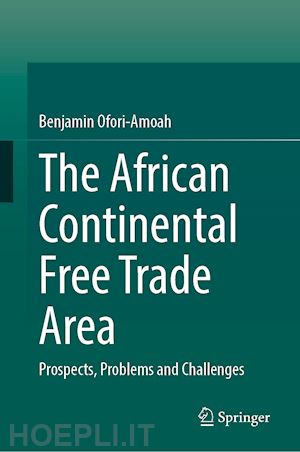

Questo prodotto usufruisce delle SPEDIZIONI GRATIS
selezionando l'opzione Corriere Veloce in fase di ordine.
Pagabile anche con Carta della cultura giovani e del merito, 18App Bonus Cultura e Carta del Docente
In March of 2018, 44 African countries signed the African Continental Free Trade Area agreement (AfCFTA) to launch what is considered as the largest free trade area in the world. The signing of the agreement has been hailed as a major breakthrough for African development by African countries and organizations as well as external observers of African affairs. This is not the first time African countries have proposed a new organizational and institutional structure for development. African countries have signed at least 13 regional trade agreements (RTAs) for intraregional trade since 1959. However, the track record of these groups has been relatively mediocre compared to RTAs elsewhere. Thus, Africa has the lowest percentage of intracontinental trade in the world.
This volume evaluates the prospects and challenges for the AfCFTA through a deep-dive assessment of previous trade blocs on the African continent and of regional free trade areas in other parts of the world. The central question of the book is this: If pre-AfCFTA trade blocs in Africa did not encourage more intracontinental trade, what guarantees that the AfCTA will? The formation of the AfCFTA will definitely remove overlapping membership that existed with previous trading blocs on the continent, but what is different about the AfCFTA that will get rid of cumbersome regulation, boost manufacturing, and create jobs? This book argues that the dreams of AfCFTA will not be realized unless African countries make efforts to address the industry mix of their economies and to enforce the rules and regulations they set down on paper.
Chapter 1. Introduction.- Chapter 2. Perspectives on International Trade and Development.- Chapter 2. Regional Trade Agreements: Theory, Aspirations, and Realities.- Chapter 3. The Economic Community of West African States.- Chapter 4. The Economic Community of Central African States.- Chapter 6. The Southern African Development Community.- Chapter 7. The Community of Sahel-Saharan States.- Chapter 8. The East African Community.- Chapter 9. The Common Market for Eastern and Southern Africa.- Chapter 10. Other Regional Trade Agreements.- Chapter 11. Conclusion.
Benjamin Ofori-Amoah is Professor of Environment, Geography, and Sustainability and the Director of the School of Environment, Geography, and Sustainability at Western Michigan University in Kalamazoo, Michigan. He is an economic geographer and urban and regional planner with interests and expertise in economic development. His current research focuses on African economic development, and local economic development with reference to America’s small cities.











Il sito utilizza cookie ed altri strumenti di tracciamento che raccolgono informazioni dal dispositivo dell’utente. Oltre ai cookie tecnici ed analitici aggregati, strettamente necessari per il funzionamento di questo sito web, previo consenso dell’utente possono essere installati cookie di profilazione e marketing e cookie dei social media. Cliccando su “Accetto tutti i cookie” saranno attivate tutte le categorie di cookie. Per accettare solo deterninate categorie di cookie, cliccare invece su “Impostazioni cookie”. Chiudendo il banner o continuando a navigare saranno installati solo cookie tecnici. Per maggiori dettagli, consultare la Cookie Policy.